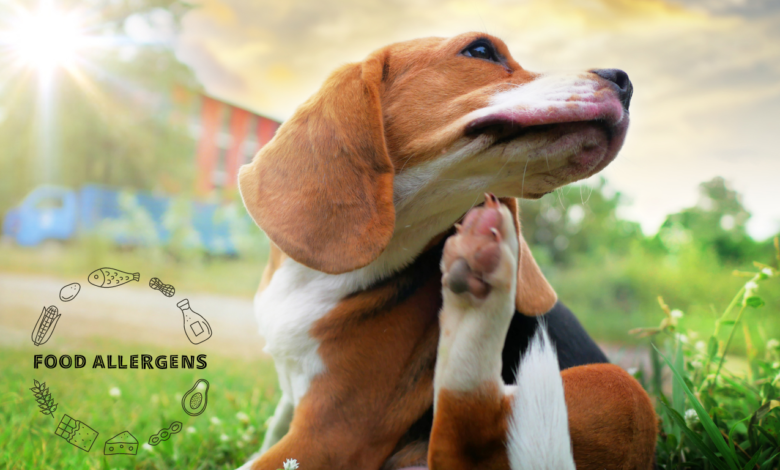
Food Allergies in Dogs: Causes, Symptoms, and Management

When it comes to our beloved canine companions, ensuring their health and well-being is of paramount importance. Like humans, dogs can also experience food allergies that can lead to discomfort and health issues. In this article, we will delve into the food allergies in dogs, exploring their causes, symptoms, diagnosis, and the necessary steps to manage and prevent these allergies.
Understanding Food Allergies
What Are Food Allergies in Dogs?
Food allergies in dogs occur when their immune system reacts negatively to specific proteins in their diet. The immune response triggers various symptoms that can vary from mild to severe. According to Dr. Angela Rollins, a board-certified veterinary nutritionist, “The immune system recognizes certain proteins as foreign invaders and mounts an allergic response, which can lead to itching, gastrointestinal upset, and other symptoms.”
Common Culprits: Foods That Often Trigger Allergies
Certain ingredients are more likely to trigger food allergies in dogs. According to a study published in the Journal of Small Animal Practice, common allergenic foods include:
- Chicken and poultry products
- Beef and dairy products
- Wheat and other grains
- Soy and corn
Spotting the Signs
Allergy Symptoms to Watch Out For
Identifying food allergies in dogs can be challenging, as their symptoms often overlap with other health issues. Some common signs of food allergies include:
- Itchy skin and excessive scratching
- Red and inflamed skin or ears
- Chronic ear infections
- Digestive problems like diarrhea and vomiting
Differentiating Allergies from Intolerances
Distinguishing between allergies and intolerances is crucial. According to Dr. Rebecca Remillard, a veterinary nutritionist, “Allergies involve the immune system and can lead to more severe symptoms, while intolerances typically cause digestive discomfort without immune involvement.”
Diagnosing Food Allergies
Veterinary Consultation and Medical History
If you suspect your dog has a food allergy, consult a veterinarian. Dr. Sarah Wooten, a practicing veterinarian, emphasizes the importance of a thorough medical history: “Detailed information about your dog’s diet, symptoms, and medical background is crucial for accurate diagnosis.”
Elimination Diet Trials: Unraveling the Culprit
Elimination diets involve feeding your dog a novel protein and carbohydrate source to identify specific allergens. Gradually, ingredients are reintroduced to pinpoint the trigger. A study in the Journal of Veterinary Internal Medicine states that “elimination diets are considered the gold standard for diagnosing food allergies.”
Managing Food Allergies
Tailoring a Specialized Diet Plan
Once the allergens are identified, your veterinarian can help create a specialized diet plan that eliminates these triggers. This may involve commercial hypoallergenic diets or homemade meals. Dr. Lisa Freeman, a veterinary nutritionist, advises that “the diet should be nutritionally complete and balanced to ensure your dog’s health.”
Reading Labels: Navigating Ingredients Lists
Become a label detective. Carefully read pet food labels to ensure they are free from allergenic ingredients. Look for transparency about protein sources and avoid foods with fillers. The American Kennel Club recommends looking for labels with limited ingredients, such as “single protein” or “limited ingredient diet.”
Preventing Allergic Reactions
Introducing New Foods Cautiously
When introducing new foods, do so gradually. Monitor your dog for any adverse reactions, and if you notice symptoms, consult your veterinarian. Dr. Jessica Potosky, a veterinarian, advises, “Small portions of the new food over several days can help gauge your dog’s tolerance.”
Homemade vs. Commercial Dog Food: What’s Best?
Both options have pros and cons. Commercial hypoallergenic diets offer convenience, while homemade diets provide more control over ingredients. Dr. Jennifer Coates, a veterinary medical advisor, suggests consulting a veterinary nutritionist if considering a homemade diet to ensure proper nutrition.
Caring for Your Allergic Pup
The Role of Nutritional Supplements
Certain supplements, such as omega-3 fatty acids and probiotics, can support your dog’s skin and immune system health. A Journal of Nutritional Science study indicates that omega-3 fatty acids can help reduce inflammation and itching associated with allergies.
Maintaining a Healthy Lifestyle Beyond Diet
Regular exercise, proper grooming, and a stress-free environment contribute to overall well-being and can help alleviate allergy symptoms. Dr. Karen Becker, a proactive wellness veterinarian, emphasizes that “a healthy lifestyle strengthens the immune system, making it better equipped to manage allergies.”
When Allergies Strike: Emergency Care
Anaphylaxis in Dogs: Understanding the Severity
Anaphylactic reactions are rare but severe. Symptoms include difficulty breathing, swelling, and collapse. Seek immediate veterinary assistance if you suspect anaphylaxis. The American Veterinary Medical Association emphasizes that prompt medical attention is crucial in such cases.
Steps to Take During an Allergic Reaction
Stay calm and keep your dog as quiet as possible. Administer any prescribed medications and head to the nearest veterinary clinic promptly. Dr. Julie Churchill, a clinical nutritionist, recommends having an emergency plan, including contact information for your vet and nearby emergency clinics.
Allergies and Breed Predisposition
Breeds Prone to Food Allergies
Certain breeds, such as Labrador Retrievers and German Shepherds, are more susceptible to food allergies. Genetics play a role in their predisposition. A study published in the Journal of Comparative Pathology found a higher prevalence of food allergies in certain breeds.
Genetics and Susceptibility to Allergic Reactions
Genetic factors can influence a dog’s likelihood of developing allergies. Breeding practices can impact the prevalence of allergies in certain breeds. Dr. Susan G. Wynn, a veterinary nutritionist, suggests that responsible breeding can help reduce the risk of passing on allergic tendencies.
Looking Beyond Food: Other Allergens
Environmental Allergies: Pollen, Dust, and Mold
Dogs can also be allergic to environmental factors like pollen, dust mites, and mold. These allergies can contribute to skin irritation and respiratory issues. According to a Journal of Veterinary Dermatology study, environmental allergies can exacerbate food allergy symptoms.
Contact Allergies and Their Impact
Certain materials, such as synthetic fabrics or cleaning chemicals, can trigger contact allergies in dogs. Pay attention to any reactions when introducing new products. Dr. Cathy Barnette, a practicing veterinarian, advises using pet-safe products and observing your dog’s response to new environments.
Conclusion
Navigating food allergies in dogs requires vigilance and dedication from pet owners. By understanding the causes, symptoms, diagnosis, and management of food allergies, we can provide our furry companions with a higher quality of life and a happier, healthier journey.
FAQs
1. Can dogs develop allergies over time?
Yes, dogs can develop allergies at any age, even if they previously showed no signs of sensitivity. (Source: American Kennel Club)
2. Is grain-free dog food a solution for allergies?
Not necessarily. While some dogs may benefit, consulting a vet before making dietary changes is essential. (Source: Tufts University Cummings School of Veterinary Medicine)
3. Can homemade diets adequately address food allergies?
Homemade diets can work but must be carefully formulated to meet nutritional needs. (Source: American Veterinary Medical Association)








One Comment